Tuesday, Sept. 11, 2001, began just like any other day for sixth grader Patrick Montgomery. When the day ended, Montgomery had a new purpose and focus.
Montgomery watched terrorists attack the twin towers that morning and spoke to his father that night. He said that if the United States went to war, and if the war was still going on when he graduated high school, he would like to help protect his country.
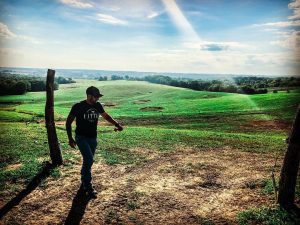
“I just remember watching the towers fall,” Montgomery said. “Those images had a tremendous impact on my life.”
Montgomery went through the grueling Ranger Assessment and Selection Program two years after graduating from Park Hill South High School in Riverside, Missouri. The eight-week course in Fort Benning, Georgia, pushes its future Army Rangers to the brink both mentally and physically.
Montgomery was encouraged to go the Ranger route by his brother-in-law, Jeremy Katzenberger, an Army Ranger. Katzenberger married Montgomery’s sister, Colleen, when Montgomery was in tenth grade. The two were incredibly close, meeting in 2003 when Montgomery was in eighth grade and Katzenberger was in college.
“I had this idea that I wanted to be a Navy Seal,” Montgomery said. “Jeremy kind of thought that might not be the best idea. He talked me into going into the 1st Ranger Battalion. Throughout high school, my main goal was to become a Ranger. It was the only contract I would take from the military.”
Montgomery powered through the Ranger Assessment and Selection Program and was honored with a place among the Army Rangers. Montgomery and the rest of his battalion were deployed a couple months after graduation, in 2011. Just a few weeks into that deployment Montgomery’s world was shaken. Katzenberger was killed in the line of duty. Montgomery, only 21 years old, escorted Katzenberger’s body back to the United States.
“Bringing him home is probably the biggest honor I’ll ever have for the entirety of my life,” Montgomery said. “It was a huge crux in my life, though. Something like that changes you. Everyone handles grieving differently. I wish I could say that I handled it the best, but I probably didn’t. I was headed down a dark path. I honestly didn’t think I would live to see my 30th birthday.”
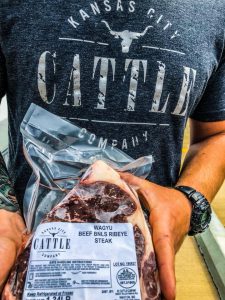
Montgomery completed his military contract and was then left at a crossroads.
“I was considering two paths,” Montgomery said. “My first option was to apply for a more dangerous unit. My second option was to get out of the military completely. My girlfriend, who is now my wife, was kind enough to help guide me without telling me what I should be doing. She asked if I had given any thought to what interested me on the civilian side of things. I hadn’t thought about anything – I thought I was going to be in the military my entire life.
“I made the decision that the military probably wasn’t the best choice for me anymore. I was ready to do something else.”
Montgomery knew Katzenberger would want him to attack a new goal with the same passion he had attacked his Ranger training.
“I knew if he was here, he wouldn’t want me beating myself up,” Montgomery said. “He would have wanted to see me succeed and do something great with my life.”
A passion for animals led Montgomery to the University of Missouri, where he earned an animal sciences degree, in 2016. He combined that passion with an interest in entrepreneurship to create the KC Cattle Company. The company raises quality wagyu beef – and Montgomery has worked hard to help veterans get back on their feet. The farmers and ranchers at the KC Cattle Company are all veterans.
“When the KC Cattle Company first began, I had a buddy from my regiment who came down and stayed with me for a few days,” Montgomery said. “We were out working cattle, and he thought it was phenomenal. He told me that when I started hiring, I should really consider an all-veteran staff. I hadn’t given much thought to the makeup of my future staff, but this made a lot of sense.
“The cool part, for veterans, is that you get back that community you had in the military. A big part of what we all miss when we transition out of the military is that brotherhood. These are people who have been through the same experiences as you. We can be a little morbid because of some of the things we’ve been through, but it’s important to have that camaraderie.”
In the Trenches
After deciding to not renew his contract, Montgomery relied on that training to mold a new path as a civilian. Montgomery’s girlfriend, Kaleigh, who is now his wife, sent him several ideas related to his passion for animals. She suggested he become a veterinarian.
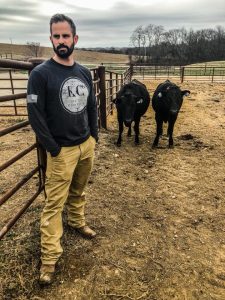
“I balked at the idea at first,” Montgomery said. “I was going to be way behind, plus there was the issue of student loans. I didn’t really want to think about it.”
Montgomery did some research, though. He found out that he qualified for the Missouri Returning Heroes Act, which provides reduced tuition for certain combat veterans. Combined with a few grants, Montgomery decided that he could make it work. He reached out to the Division of Animal Sciences at MU and was put in touch with Trista Strauch-Safranski.
“Dr. Strauch was absolutely tremendous,” Montgomery said. “She helped me get everything set up and in line.”
Montgomery graduated in 2016 with a degree in animal sciences. During his time in the College of Agriculture, Food and Natural Resources, Montgomery figured out that animal medicine wasn’t for him. The ranch life seemed like a much better fit. As Montgomery began to look toward his future, a conversation with a former Ranger laid the foundation for the KC Cattle Company.
“One of Jeremy’s best friends, who I served as a pallbearer with, had an operation where he sold beef directly to restaurants,” Montgomery said. “He really helped me envision what I wanted to do after college.”
Montgomery’s military training and never-say-die attitude carried over as he began to form the idea. When Montgomery began to pitch the idea of the KC Cattle Company around, there were a few doubters.
“There was a hint of naiveness on my part about jumping into this,” Montgomery said. “I had a business plan put together and thought I was ready to go. I talked with a couple financial institutions and they pretty much laughed me out of their offices, which was totally understandable.”
Montgomery didn’t slow down, however. His first focus was on acquiring land.
“Tracking down land was an absolute nightmare,” Montgomery said. “Everyone I talked to wanted me to go further north, as the land was cheaper. For the type of business I’m running, it was vital for me to be in a community that is focused on the farm-to-table movement.
“That area, to me, was around Platte County. It’s also close enough to the city that people can come out here and see what we’re doing.”
Montgomery found a farm in Weston that was move-in ready. The cost was right and the operations were ready. The KC Cattle Company had found a home.
The Wagyu Way
It was important for Montgomery to make the KC Cattle Company unique. Montgomery felt wagyu beef would do just that.
“I had done research on the breed while I was getting my degree in the Division of Animal Sciences at Mizzou,” Montgomery said. “My goal was to offer the meat straight to the consumer. I also wanted to distinguish my product from what you would buy at the store. Wagyu definitely does that.”
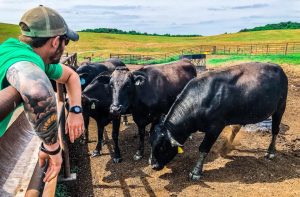
Wagyu is a Japanese beef cattle breed. The term wagyu refers to all Japanese beef cattle, as ‘wa’ means Japanese and ‘gyu’ means cow. The breed was primarily used as draft animals early on in Japan. That work would eventually lead to an accidental benefit.
“As the animals were selected over hundreds of years, extraordinary amounts of intramuscular fat developed to support their strenuous physical activity,” Montgomery said. “In premium steaks, intramuscular fat means marbling and marbling means flavor. This is one of the factors that makes wagyu steaks so incredibly wonderful. The second attribute of wagyu is the lower melting point of the intramuscular fat. These traits combined make for unique and delectable eating experiences.”
Wagyu found its way to the United States in the 1970s. A bigger push came in the late 1980s and early 1990s. The last shipments would become the foundation for American wagyu beef.
Montgomery said they harvested around 60 head of cattle in 2018. The company sells a variety of wagyu products, including hot dogs, summer sausage, brisket, ground beef, rump roast and several other premium cuts. Montgomery added that they will harvest closer to 150 head of cattle in 2019.
“At the KC Cattle Company, we pride ourselves on selecting cows from the most established wagyu breeders,” Montgomery said. “Each steak we sell is visually inspected for signs of unsatisfactory characteristics or lack of marbling.”
The Future
Montgomery said the early part of 2018 was a bit of a roller coaster. He was still trying to get his footing as an entrepreneur – and trying to make the KC Cattle Company a sustainable business.
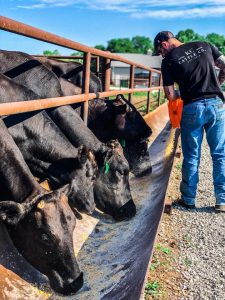
“I was convinced I had made a mistake and the KC Cattle Company was not going to make it,” he said. “I’m pretty sure the only thing that kept me going was my stubbornness and ‘never-quit’ mentality I had drilled into my head during my time in the military.”
During that time, Montgomery also found out that Kaleigh was expecting their first child. He decided that he would give himself nine months to get the company to a break-even or profitable point. If that didn’t happen, he would look for a new job.
“I have worked my butt off to grow the KC Cattle Company into something I can truly be proud of,” Montgomery said. “We saw a moderate amount of success in 2018 and none of it would have been possible if not for my business mentors, our veteran employees, my family, our amazing customers and the Lord’s blessings on my life.”
Montgomery has plans to grow his business even more this year. He is looking at adding pork and chicken products, offering tours and farm-to-table dinners, and investing in exciting partnerships with veteran organizations.
Montgomery keeps in contact with several of his professors from MU. Bryon Wiegand (professor) helped Montgomery find a meat processor. Scott Poock (associate Extension professor) and Stacey Hamilton (instructor) helped Montgomery develop a rotational grazing plan. Montgomery said he continues to stay in touch with Strauch-Safranski as well.
“I’m incredibly thankful for my time at MU,” he said. “My advice for current students would be to build a relationship with your professors. Reach out to them and ask questions. They have all been so helpful during this journey. They’re all in my corner, wanting to see me succeed. It’s an awesome feeling.”
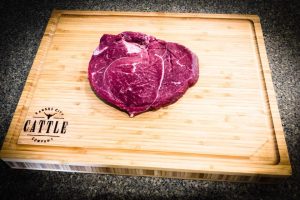
Montgomery has built a following – and is continuing to build the KC Cattle company. He has been featured in numerous national publications, including the New York Times and Feast Magazine, as well as several local spots, such as WDAF-TV and KSHB.
While there are still tough days, Montgomery relies on his Ranger training, and the memory of Katzenberger, to battle through.
“I still have moments when a darkness of doubt and guilt come over me,” Montgomery said. “Some of these moments are short and some are prolonged. The pain and grief are no longer sharp and penetrating, but rather dull and always part of me. The difference from then compared to now is I use it to fight to build my dreams and legacy. I use it to make myself a better husband, business owner, friend and family member. I look to Jeremy often for help from the beyond to show me I’m heading down the right path and often I get a subtle reply. I believe he does his best to keep me in the Lord’s good graces, despite me being undeserving.”
Visit the KC Cattle Company website to see what cuts Montgomery has for sale. You can also follow along with the company on Facebook, Twitter and Instagram.